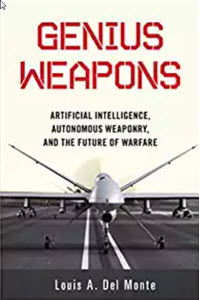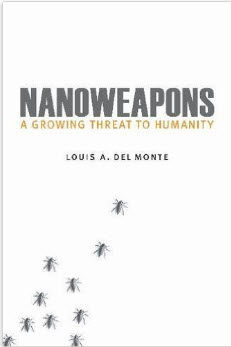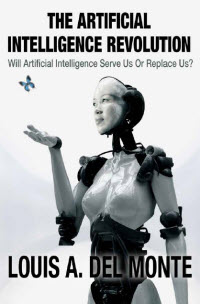This excerpt is the introduction from my book, The Artificial Intelligence Revolution. Enjoy!
This book is a warning. Through this medium, I am shouting, “The singularity is coming.” The singularity (as first described by John von Neumann in 1955) represents a point in time when intelligent machines will greatly exceed human intelligence. It is, in the way of analogy, the start of World War III. The singularity has the potential to set off an intelligence explosion that can wield devastation far greater than nuclear weapons. The message of this book is simple but critically important. If we do not control the singularity, it is likely to control us. Our best artificial intelligence (AI) researchers and futurists cannot accurately predict what a post-singularity world may look like. However, almost all AI researchers and futurists agree it will represent a unique point in human evolution. It may be the best step in the evolution of humankind or the last step. As a physicist and futurist, I believe humankind will be better served if we control the singularity, which is why I wrote this book.
Unfortunately, the rise of artificial intelligence has been almost imperceptible. Have you noticed the word “smart” being used to describe machines? Often “smart” means “artificial intelligence.” However, few products are being marketed with the phrase “artificial intelligence.” Instead, they are called “smart.” For example, you may have a “smart” phone. It does not just make and answer phone calls. It will keep a calendar of your scheduled appointments, remind you to go to them, and give you turn-by-turn driving directions to get there. If you arrive early, the phone will help you pass the time while you wait. It will play games with you, such as chess, and depending on the level of difficulty you choose, you may win or lose the game. In 2011 Apple introduced a voice-activated personal assistant, Siri, on its latest iPhone and iPad products. You can ask Siri questions, give it commands, and even receive responses. Smartphones appear to increase our productivity as well as enhance our leisure. Right now, they are serving us, but all that may change.
A smartphone is an intelligent machine, and AI is at its core. AI is the new scientific frontier, and it is slowly creeping into our lives. We are surrounded by machines with varying degrees of AI, including toasters, coffeemakers, microwave ovens, and late-model automobiles. If you call a major pharmacy to renew a prescription, you likely will never talk with a person. The entire process will occur with the aid of a computer with AI and voice synthesis.
The word “smart” also has found its way into military phrases, such as “smart bombs,” which are satellite-guided weapons such as the Joint Direct Attack Munition (JDAM) and the Joint Standoff Weapon (JSOW). The US military always has had a close symbiotic relationship with computer research and its military applications. In fact, the US Air Force, starting in the 1960s, has heavily funded AI research. Today the air force is collaborating with private industry to develop AI systems to improve information management and decision making for its pilots. In late 2012 the science website www.phys.org reported a breakthrough by AI researchers at Carnegie Mellon University. Carnegie Mellon researchers, funded by the US Army Research Laboratory, developed an AI surveillance program that can predict what a person “likely” will do in the future by using real-time video surveillance feeds. This is the premise behind the CBS television program Person of Interest.
AI has changed the cultural landscape. Yet, the change has been so gradual that we hardly have noticed the major impact it has. Some experts, such as Ray Kurzweil, an American author, inventor, futurist, and the director of engineering at Google, predicted that in about fifteen years, the average desktop computer would have a mind of its own, literally. This computer will be your intellectual equal and will even have a unique personality. It will be self-aware. Instead of just asking simple questions about the weather forecast, you may be confiding your deepest concerns to your computer and asking it for advice. It will have migrated from personal assistant to personal friend. You likely will give it a name, much in the same way we name our pets. You will be able to program its personality to have interests similar to your own. It will have face-recognition software, and it will recognize you and call you by name, similar to the computer HAL 9000 in Arthur C. Clarke’s 2001: A Space Odyssey. The conversations between you and your “personal friend” will appear completely normal. Someone in the next room who is not familiar with your voice will not be able to tell which voice belongs to the computer and which voice belongs to you.
By approximately the mid-twenty-first century, Kurzweil predicts that computers’ intelligence will exceed that of humans, and a $1,000 computer will match the processing power of all human brains on Earth. Although historically, predictions regarding advances in AI have tended to be overly optimistic, all indications are that Kurzweil is on target.
Many philosophical and legal questions will emerge regarding computers with artificial intelligence equal to or greater than that of the human mind (i.e., strong AI). Here are just a few questions we will ask ourselves after strong AI emerges:
- Are strong-AI machines (SAMs) a new life-form?
- Should SAMs have rights?
- Do SAMs pose a threat to humankind?
It is likely that during the latter half of the twenty-first century, SAMs will design new and even more powerful SAMs with AI capabilities far beyond our ability to comprehend. They will perform a wide range of tasks, which will displace many jobs at all levels in the workforce, from bank tellers to neurosurgeons. New medical devices using AI will help the blind to see and the paralyzed to walk. Amputees will have new prosthetic limbs, with AI plugged directly into their nervous systems and controlled by their minds. The new prosthetic limb not only will replicate the lost limb but also be stronger, more agile, and superior in ways we cannot yet imagine. We will implant computer devices into our brains, expanding human intelligence with AI. Humankind and intelligent machines will begin to merge into a new species: cyborgs. It will happen gradually, and humanity will believe AI is serving us.
Computers with strong AI in the late twenty-first century, however, may see things differently. We may appear to those machines much the same way bees in a beehive appear to us today. We know we need bees to pollinate crops, but we still consider bees insects. We use them in agriculture, and we gather their honey. Although bees are essential to our survival, we do not offer to share our technology with them. If wild bees form a beehive close to our home, we may become concerned and call an exterminator.
Will the SAMs in the latter part of the twenty-first century become concerned about humankind? Our history proves we have not been a peaceful species. We have weapons capable of destroying all of civilization. We squander and waste resources. We pollute the air, rivers, lakes, and oceans. We often apply technology (such as nuclear weapons and computer viruses) without fully understanding the long-term consequences. Will SAMs in the late twenty-first century determine it is time to exterminate humankind or persuade humans to become cyborgs (i.e., humans with brains enhanced by implanted artificial intelligence and potentially having organ and limb replacements from artificially intelligent machines)? Will humans embrace the prospect of becoming cyborgs? Becoming a cyborg offers the opportunity to attain superhuman intelligence and abilities. Disease and wars may be just events stored in our memory banks and no longer threaten cyborgs. As cyborgs, we may achieve immortality.
According to David Hoskins’s 2009 article, “The Impact of Technology on Health Delivery and Access” (www.workers.org/2009/us/sickness_1231):
An examination of Centers for Disease Control statistics reveals a steady increase in life expectancy for the U.S. population since the start of the 20th century. In 1900, the average life expectancy at birth was a mere 47 years. By 1950, this had dramatically increased to just over 68 years. As of 2005, life expectancy had increased to almost 78 years.
Hoskins attributes increased life expectancy to advances in medical science and technology over the last century. With the advent of strong AI, life expectancy likely will increase to the point that cyborgs approach immortality. Is this the predestined evolutionary path of humans?
This may sound like a B science-fiction movie, but it is not. The reality of AI becoming equal to that of a human mind is almost at hand. By the latter part of the twenty-first century, the intelligence of SAMs likely will exceed that of humans. The evidence that they may become malevolent exists now, which I discuss later in the book. Attempting to control a computer with strong AI that exceeds current human intelligence by many folds may be a fool’s errand.
Imagine you are a grandmaster chess player teaching a ten-year-old to play chess. What chance does the ten-year-old have to win the game? We may find ourselves in that scenario at the end of this century. A computer with strong AI will find a way to survive. Perhaps it will convince humans it is in their best interest to become cyborgs. Its logic and persuasive powers may not only compelling but also irresistible.
Artificial intelligence is an embryonic reality today, but it is improving exponentially. By the end of the twenty-first century, we will have only one question regarding artificial intelligence: Will it serve us or replace us?











